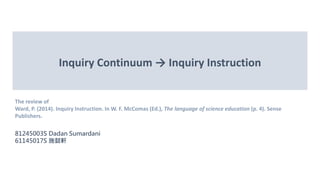Inquiry instruction is good by Dadan and 施懿軒.pptx
Inquiry instruction represents a pedagogical approach that emphasizes the role of the learner in the learning process, where students are encouraged to explore, ask questions, and investigate topics to construct their own understanding and knowledge. This method stands in contrast to traditional forms of instruction that often rely on direct teaching, where information is primarily delivered by the teacher to the student. Inquiry instruction is grounded in constructivist theories of learning, which argue that learners construct new knowledge by building upon their existing knowledge and experiences through interaction with the world around them. At the heart of inquiry instruction is the cultivation of curiosity and the development of skills necessary for students to become independent learners. This involves engaging students in authentic, complex problems that do not have straightforward answers, thereby encouraging critical thinking, problem-solving, and decision-making skills. Students are guided through a process of formulating questions, gathering and analyzing data, drawing conclusions, and reflecting on their findings. The role of the teacher in this approach shifts from being a source of knowledge to a facilitator of learning, providing support and scaffolding to students as they navigate their inquiries. Inquiry instruction can be implemented in various forms, ranging from structured to open inquiry, depending on the level of guidance provided by the teacher and the degree of autonomy granted to the students. Structured inquiry involves more teacher guidance in leading students through the inquiry process, while open inquiry allows students more freedom to pursue their own questions and methods. Regardless of the level of structure, effective inquiry instruction requires careful planning to ensure that activities are meaningful and aligned with learning objectives. The benefits of inquiry instruction include not only the development of critical thinking and research skills but also the promotion of a deeper understanding of content. By actively engaging with material, students are more likely to make meaningful connections and apply their learning to new situations. Furthermore, inquiry instruction supports the development of lifelong learning skills, preparing students to navigate an increasingly complex and information-rich world. However, implementing inquiry instruction poses challenges, including the need for significant teacher preparation, the development of appropriate assessment strategies, and the provision of adequate resources and support. Despite these challenges, inquiry instruction offers a powerful framework for fostering an engaging and student-centered learning environment that encourages exploration, curiosity, and a love of learning.

Recommended
More Related Content
Similar to Inquiry instruction is good by Dadan and 施懿軒.pptx
Similar to Inquiry instruction is good by Dadan and 施懿軒.pptx (20)
More from Dadan Sumardani
More from Dadan Sumardani (20)
Recently uploaded
Recently uploaded (20)
Inquiry instruction is good by Dadan and 施懿軒.pptx
- 1. Inquiry Continuum → Inquiry Instruction The review of Ward, P. (2014). Inquiry Instruction. In W. F. McComas (Ed.), The language of science education (p. 4). Sense Publishers. 81245003S Dadan Sumardani 61145017S 施懿軒
- 2. Inquiry Instruction • Instructional technique • Students are : • engaged in the investigation of scientifically oriented questions • seek evidence to address questions, • develop explanations/answers to the questions posed, • evaluate these explanations as well as potential alternative explanations, and • communicate their conclusions
- 3. Keyword • Science should be taught as inquiry as well as through inquiry.
- 4. Feature 1. Learn science in a way that reflects how science actually works 2. a problem-solving technique on the process of investigating the problem, rather than on reaching for a “correct” solution 3. Either Individual or collaborative; Scientists work in teams
- 5. Inquiry Continuum: Inquiry Instruction Levels Spectrum
- 6. Which one is Better?! Open inquiry* • Open inquiry is the kind of research conducted by scientists (Bell, 2005; Colburn, 2000). • Science fair also represents the ‘highest form’ of open inquiry • Open-inquiry step-by-step (Bruner, 2004): • students identify problems (brainstorm and ask questions), • work toward solutions (formulate questions, investigate, and analyze), and • establish solutions (interpret results, discuss, reflect, make conclusions and present results). *most learner centered level of inquiry
- 7. Four-question strategy (Cothran et al., 2000) • Aims: to help chemistry students answer their own research questions using the reaction of hydrochloric acid and aluminum foil. • Activity: to accommodate the students’ varied experience and comfort levels with the inquiry process. • Finding: students were more engaged and took ownership of the activity as well as content. • Implication: Teachers can scaffold inquiry into chemistry instruction with investigations already in use.
- 8. To what extend teachers need to use Inquiry? • Context and student readiness are important considerations with respect to inquiry instruction; novice and intermediate learners should receive explicit guidance by practice and feedback (Clark et al., 2012) • Students who learn with open inquiry methods and little feedback become lost and frustrated, and lead to the misconceptions • Need a continuum of structured → guided → open inquiry
- 9. Benefit 1. Provide students a more accurate understanding of how science research is conducted, 2. Encourage students to develop creative solutions to problems, 3. Develop improved understanding of science concepts largely by providing a meaningful context for learning 4. Better recognize gaps in their content knowledge without fear of failure 5. Lead them to find new scientific principles, refine prior knowledge, and even discover misconceptions 6. apply their scientific understanding in the pursuit of RQ, allowing them to reinforce and enrich its connections to other knowledges.
- 10. Limitation/Problem in Classroom 1. Students may not have the science content background and pedagogical experiences necessary to support this teaching technique. 2. Significant time to: 1. thinking relevance problems to the students, 2. providing resources to investigate the problems, and 3. planning tools for assessment 3. True inquiry-based instruction can seem “chaotic” (like our thesis*) Some may finish quicker than others 4. Freedom to engage vs standardized testing requirements
